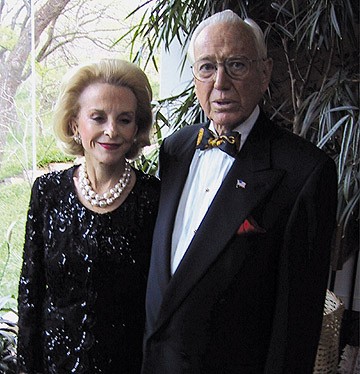
Dedman balances life’s commitments
Nature dwarfs the walls of the Dedman estate and establishes the understatement of a contemporary home nestled in the woods. Natural stone is dabbled with dancing patches of sunlight filtered through the forest of trees. There is balance.
The house and grounds are simple, allowing the sculpture and paintings to speak without challenge, but with compliment.
The artwork is carefully chosen and placed. Never ostentatious. Balance.
Clean straight lines merge with the organic as bluebonnets and Indian paintbrush are reflected by a pond with a pier for fishing. The balance is no accident.
Robert Dedman has built his life around the principle of balance. Though he still refers to himself as a salesman, even on his tax returns, he is a philosopher whose strategies of living have propelled him from one success to another. His achievements are most often measured in dollars, but his gifts extend well beyond the realm of economics.
He began embracing the experiences that would shape his life as a young boy. From humble beginnings he discovered that his own hard work and determination would bring with it success. He also learned the important element of planning. His achievements were always preceded with a clear goal. One of his many goals was to make $50 million before he turned 50 and give it all away before he died. He has by far exceeded the goal of making his fortune and is still giving it away.
But, even with such lofty goals, he never lost his perspective, his balance.
The stellar student and star baseball player from Rison, Ark., moved frequently with his family and traveling salesman/entrepreneur father.Upon entering North Dallas High School he made the varsity baseball team. With a batting average of .563 he won a college scholarship. His athletic abilities did not preclude his academic success as he graduated as valedictorian of Dallas High and received several merit scholarships. All of this following a plan toward his goals.
Some things can’t be planned for. In 1944, with the United States entering World War II, Dedman enlisted in the elite Naval Air Corps. Offers and aspirations of a professional sports career and college were pushed aside.
Fond of poetry and literature the lines of a Rudyard Kipling poem would, and still does, give him strength.
“If you can force your heart and nerve and sinew to serve your turn long after they are gone, and so hold on when there is nothing in you except the will which says to them: Hold on,” wrote Kipling in his poem “If.”
He knew that his effort was a great part of the journey. In his autobiography “King of Clubs” Dedman wrote “Winning is never easy and it shouldn’t be.”
As the war was nearing its end the Navy sent Dedman to study at the North Texas Agricultural College, now the University of Texas at Arlington. With straight A’s he was allowed to take 20 and more hours per semester. At a rigorous pace he earned three degrees in four years. With the goal of becoming a lawyer one of those degrees was in law. He continued to study law and earned his master’s while in active practice.
Clients kept him busy. While working more than 60 hours a week at his law practice he balanced family life, work and a new vision.
The title of his autobiography may seem cliché, but is unarguably true. Moonlighting over a period of seven years he developed a concept of country club structure and management that revolutionized the industry. By building three golf courses around a single clubhouse the overhead was proportionally reduced, leading to greater membership and profits. He opened Brookhaven Country Club in 1957 on the far north outskirts of Dallas near the end of a narrow Valley View Lane. His concept has grown and ClubCorp now has over 210 clubs and worth of more than $1.6 billion. He is surely the “King of Clubs,” but as the book is subtitled he would “Grow rich in more than money.”
His philosophy of is simple, balance and inclusion. Work must be a part of play and play is an integral part of work. Family is woven tightly into the fabric of endeavor.
SMU is among many institutions to benefit from the generosity of Robert and his wife Nancy. Their name is carved in stone edifices and facades from Dedman College, the Dedman School of Law, the much imitated and pioneering Dedman Center For Lifetime Sports and the Dedman Life Sciences Building providing opportunity where it wasn’t before. The Dedman name graces transcripts and letterhead notifying students that their effort has been rewarded with scholarships in pursuit of their goals.
SMU has benefited with more than $82 million in gifts from the Dedmans.
As a director of the Horatio Alger Association he joins in giving more than 108 scholarships every year. He has given $100 million in merit scholarships. There are currently more than 800 merit scholars attending the University of Texas at Austin, thankful to Dedman scholarships. The number of UTA merit scholars exceeds all other universities in the United States except Harvard.
“Robert Dedman brings a great spirit of service and generosity to SMU,” SMU President Gerald Turner said. “His company, ClubCorp, is built upon providing quality service to people. His sensitivity to the needs and aspirations of people, faculty, staff, and students influence his decisions and contributions to resolving challenges faced by the University.”
Robert Dedman has by far exceeded the goals of his youth. Industrious individuals, for many years to come, will benefit by his gifts both material and philosophical.
As Kipling wrote and Dedman long ago memorized, “If you can fill the unforgiving minute with sixty seconds worth of distance run Yours is the Earth and everything thats in it, And which is more youll be a man my son!”
Which is more is that he has learned there is so much more, and more important, in life than money.











